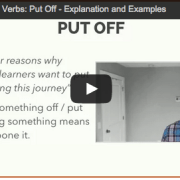Welcome!
You want to learn some English phrasal verbs, right?
Well, you’re in the right place I am about to share the ten most important phrasal verbs in English.
What makes these phrasal verbs so important? Well, firstly, these are the phrasal verbs that Iʼve made lessons on in the past 😂But also, these are commonly used in everyday English and very useful to help you understand natural English.
As always, use them if you understand them – and use my To Fluency Method to internalize them – more about that later…
Ready for number one? In no particular order:
1: Get along (with)
If you get along with someone, it means that you have a friendly relationship with that person. That you connect with each other.
For example:
- I get along with most people
- He just doesnʼt get along with her
- Do you think that theyʼre going to get along?
Get the full lesson on this here.
2: Come up with
This means to think of an idea or create a plan. For example, a manager might say:
- if one us doesnʼt come up with something tonight, our business wonʼt be here tomorrow.
Thatʼs quite an extreme example, but it is often used in pressure situations.
Another example is this: I always come up with my best ideas in the shower. Do you?
And did you notice the intonation when I said: Who came up with that idea?
3: Call Off
To call something off means to cancel something.
For example, I might write this on my soccer teamʼs WhatsApp group page:
- Sorry, lads. The game has been called off. Too much rain.
But you wouldnʼt say, the flightʼs been called out. Youʼd say:
- the flight’s been canceled
Itʼs just a collocation – certain words go together to make it sound more natural. Thatʼs why itʼs key to learn English through sentences.
4: Put Off
Weʼve put off the field trip until next week. This means that the field trip has been delayed.
Itʼs easy to put things off unless you have a deadline.
Youʼll hear someone say, “I keep meaning to call them but I just keep putting it off.”
Or if you have to tell someone some bad news. For example, you want to fire someone at work. But you know it wonʼt be pleasant to do, so you keep putting it off.
5: Make up for
Imagine that a defender on the soccer/football team you support scores an own goal.
The ball hits him in the face and it goes in the goal heʼs trying to defend. Heʼs embarrassed. His own fans are booing him. Heʼs in a bad place.
But then, he scores a goal for your team – this time – to equalize. The commentator will say,
- “Well, heʼs made up for his error in the first half with that goal.”
This means to do something as a way of correcting something else. The defender made a mistake but he corrected this mistake by scoring a goal. Itʼs used in relationships too:
- I hope these flowers make up for what I said before
This is when youʼve been a naughty boy or girl.
6: Catch up on something
“No…. donʼt watch that episode now. I need to catch up on the last one first!” This means to do something you havenʼt been able to do.
You havenʼt watched the last episode and you need to do that first before you watch the next one.
This is true for me right now: I need to catch up on sleep.
At university, you might need to catch up on your lectures.
Oh, and if you havenʼt watched my latest lessons, catch up on them after this one.
7: Get through
Whenever I see this phrasal verb, I instantly think of the song, “I gotta get through this.” Was that popular where you are?
There are quite a few uses for this one.
For example, you can never get through to a real person when you call customer service these days. It just means to be able to speak to someone on the phone.
But to get through something might also mean to finish something. Iʼve got to get through all these emails by tonight.
But the song that I mentioned before, I gotta get through this, means that he has to go through a difficult period. To be strong.
Itʼs going to be hard, but youʼll get through it.
8: Move out
This is often used like this:
- I need to move out of parentʼs house
It just means to live somewhere else. I moved out of my parentʼs house when I went to university. But I moved back in after university.
Move in means the opposite of move out. I went to live with my parents again after university.
- Weʼre moving out next week but donʼt move in until the week after so weʼre not sure what to do
9: Look after
To look after something means to care for something.
For example, when we go on holiday, we need someone to look after our dogs. We normally ask our friends by text: can you look after our dogs this weekend? Is there any chance you can look after our dogs this weekend?
Another example is this: itʼs hard work looking after children all day. It is! Itʼs knackering. You can also say, “make sure you look after it.”
For example, if you lend your favorite pen to a friend. Make sure you look after it! Itʼs a nice pen.
10: Grow up
Just grow up, will yaʼ!
This is what youʼll hear parents say to their child. Itʼs like saying, be more mature with your behavior – youʼre writing on the walls. Youʼre sixteen now. Grow up!
But to grow up somewhere means to spend your childhood in that place. For example, I grew up in Lancashire, England.
Back in my day, there wasnʼt any internet. Or any of that Instagram. We grew up playing on the streets.
This means that I spent my childhood playing on the streets.
I grew up watching wrestling. Listening to rap music. And playing a lot of football.
Those were the days.
———
Alright, so there you have it. The 10 Most Important Phrasal Verbs youʼll ever need to know.
Choose, 1, 2, 3, or all of the phrasal verbs used in this lesson and leave examples. This is your chance to practice.
Then, share this video. Share it on Facebook, Twitter, Whatsapp “Instagram” – anywhere really.









